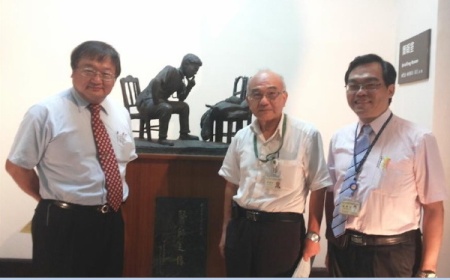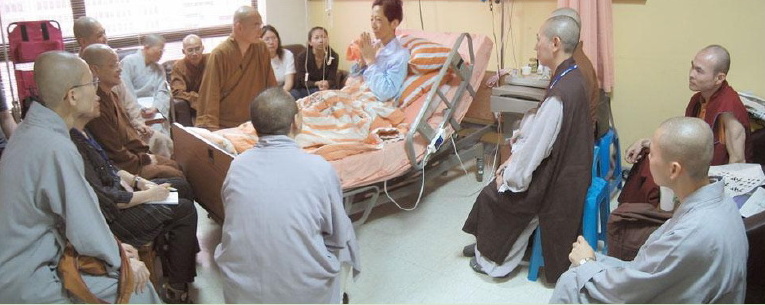Spiritual care in Taiwan:
Introducing the Clinical Buddhist Chaplain in palliative care
To acknowledge World Hospice and Palliative Care Day on 11 October, the European Association for Palliative Care (EAPC) is delighted to present current developments in hospice and palliative care in Taiwan as part of a special series of posts. In June this year, Professor Sheila Payne, President of the EAPC, was invited to Taiwan; we are very pleased that three of the many palliative care practitioners and academics she met during her visit have agreed to share their experiences of research, spiritual care and clinical practice.
Dr Chien-An Yao, Director of Palliative Care Unit, Department of Family Medicine, National Taiwan University Hospital, and Secretary General of Taiwan Academy of Hospice Palliative Medicine, continues our special series on Taiwan.
About 15% of the Taiwanese believe in Christianity. However, most
people believe in folk religions, including Buddhism, which account for
about 80%-90% of the population. They also accept the Buddha Dharma and
the care model of Clinical Buddhist Chaplains.
Taiwanese indigenous spiritual care began in 1995 when the Hospice
and Palliative Care Unit of the National Taiwan University Hospital was
first established. The unit received research grants to study the
possibility of applying Buddha dharma in terminal care, resulting in the
launch of the training programme for Clinical Buddhist Chaplains (CBC)
in 2000. While Western hospice care, based on the life structure of the
body, mind, and soul as conceived of in Christianity, focuses on the
spiritual care of the patient, Buddhists may concentrate on the four
establishments of mindfulness regarding the body, feelings, states of
mind, and phenomena, or focus on the life structure of the body, mind,
and wisdom.
Spirituality is thus defined as: “the ability to respond to, to
realise and to understand the right dharma.” It is a power, and
manifests the maturity of the mind. It emphasises the importance of
regarding the patient as demonstrator – someone who not only receives
care but also shows us how to face death. Qualified CBCs are required to
successfully complete a training programme consisting of lectures as
well as bedside practicum on applying Buddhist practices to end-of-life
care. According to the Four Noble Truths, clinical diagnosis and
treatments can be stated as follows:
- spiritual suffering is identified from the sickness categorised into physical, psychological, family, social and spiritual aspects;
- the goal of care is planned according to ‘Four Dwellings in Mindfulness’;
- the effects of the practice of Buddhist methods are carefully evaluated and recorded.
CBCs have been involved in hospice palliative care for more than 10
years and have now become core members of the hospice palliative care
team in Taiwan. A CBC does his/her best to help patients based on their
needs to improve their life quality. After learning the basic
experiences of being alongside a dying patient, CBCs develop their own
skills in teaching Buddha dharma. Training programmes to be a
professional CBC are divided into four stages:
- a basic three-month clinical training programme on hospice wards;
- continuing education programme and advance study;
- teaching skills training programme; and
- a faculty development programme.
There are now 35 qualified CBCs working in 39 units across 13 areas
of Taiwan. In palliative care units, CBCs who have completed the
training provide bedside care to terminally ill patients, resolve
patients’ spiritual sufferings, promote their spiritual status and
reduce their death fears. These practices help patients to transcend the
worldly dharma, discover their ‘inner’ power, improve their life
quality and achieve a good death. CBCs also provide life education to
family members, transform obstacles into practical assistance, reduce
grief, and boost the morale of the palliative care team.
References
Ching-Yu Chen 2012. Clinical Buddhist chaplain based spiritual care in Taiwan. Taiwan Journal of Hospice Palliative Care 17 (3), 300-309.
Ching-Yu Chen 2012. Clinical Buddhist chaplain based spiritual care in Taiwan. Taiwan Journal of Hospice Palliative Care 17 (3), 300-309.
Huimin Bhikshu 2012. The role of mindfulness in hospice & palliative care in Taiwan. Taiwan Journal of Hospice Palliative Care 17(2), 200-209.
Jonathan S. Watts and Yoshiharu Tomatsu (2012). Buddhist care for the dying and bereaved. Simon & Schuster.
Links and resources
- Lotus Hospice Care Foundation.
- The XVIth Congress of the International Association of Buddhist Studies (IABS).
Follow the EAPC blog on Friday 10 October
To catch the final post in our special series to celebrate World Hospice and Palliative Care Day, please visit the blog on Friday. Dr Ping-Jen Chen, a consultant geriatrician and hospice palliative medicine specialist from Taiwan will be writing about cross-cultural experiences of palliative care.
To catch the final post in our special series to celebrate World Hospice and Palliative Care Day, please visit the blog on Friday. Dr Ping-Jen Chen, a consultant geriatrician and hospice palliative medicine specialist from Taiwan will be writing about cross-cultural experiences of palliative care.
World Hospice and Palliative Care Day 11 October 2014 – Achieving Universal Coverage of Palliative Care: Who Cares? We Do!
With just four days to go, people across the world are preparing to celebrate World Hospice and Palliative Care Day. Anybody can get involved and raise awareness and funds for their local hospice and palliative care service. These services need your help to ensure that people living with life-limiting illnesses, their families, friends and carers receive the care and support that they need. Let’s get involved and support World Hospice and Palliative Care Day now. Please visit the World Day website for information, ideas and inspiration…
With just four days to go, people across the world are preparing to celebrate World Hospice and Palliative Care Day. Anybody can get involved and raise awareness and funds for their local hospice and palliative care service. These services need your help to ensure that people living with life-limiting illnesses, their families, friends and carers receive the care and support that they need. Let’s get involved and support World Hospice and Palliative Care Day now. Please visit the World Day website for information, ideas and inspiration…


No comments:
Post a Comment